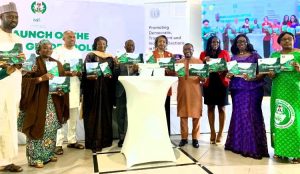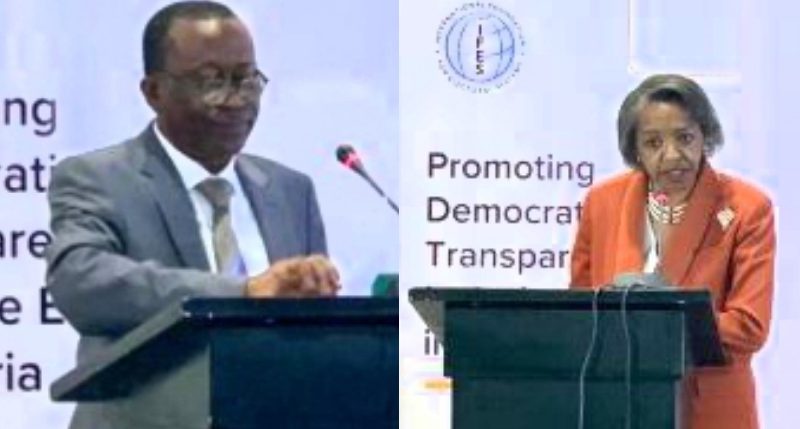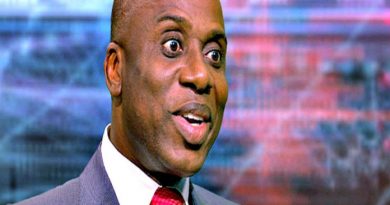REVISED GENDER POLICY WILL STRENGTHEN ENGAGEMENT WITH STAKEHOLDERS ON INCLUSIVITY- INEC
Oru Leonard
In another demonstration of its unrelenting commitment towards electoral inclusivity, the Independent National Electoral Commission (INEC) has launched the revised INEC Gender Policy (IGP) .
The Gender Policy which was first developed in 2014, guided by the National Gender Policy (2006) and other Regional and International Instruments to which Nigeria is a signatory, has a provision for review every five years.
At a Public Presentation held in Abuja, on Tuesday, 17th May, 2022, organised with support from the International Foundation for Electoral Systems (IFES), Chairman of the Commission, Professor Mahmood Yakuku, declared that the launch of the revised Gender Policy is a milestone achievement which will strengthen the Commission’s capacity to engage stakeholders to take on broad gender-sensitive issues in their mainstream operational and electoral plans and actions .
Represented by the Chairman of the Outreach and Partnership Committee (OPC), Professor Kunle Ajayi, the INEC Chairman explained that the revised Policy will also further boost the Commission’s electoral inclusiveness.
Professor Yakubu commended the painstaking efforts from within and outside the Commission put towards developing the revised document . He said; “today’s public presentation of the INEC Gender Policy (2021-2026), is a celebration of yet another successful outcome of intensive and extensive engagements with our stakeholders which comprises political parties, MDAs, development partners, gender-focused CSOs and other leading gender experts to review, validate and recalibrate INEC Gender Policy guided by international best practices for a sustainable implementation for greater women participation as aspirants, candidates, electorate, observers and personnel in the electoral process”.
Harping on the premium placed on Gender mainstreaming and deliberate steps taken to work the talk, Professor Yakubu recalled that the Commission in March, 2021 created the Gender and Inclusivity Department. This decision according to him “was carefully taken by the Commission to give a special focus to electoral equity, fairness and inclusion, especially the universally recognised rights of the disadvantaged groups, including women to participate in the electoral space on equal basis by structurally addressing the impediments that hinder their effective participation”.
He continued “Strategically put, with a Gender and Inclusivity Department established and a revised policy tool for intervention put in place for another five years show the Commission’s unrelenting commitment on electoral inclusion”.
“This policy outlook for seamless interface on gender sensitive issues on the electoral process in the country could not have been more reassuring, even as the nation is gearing towards another General Election and off- season elections”, he added.
The INEC Chairman was full of appreciation to IFES for the support in actualizing the development and review of the INEC Gender Policy, saying, “we appreciate the invaluable contribution of IFES min bringing this pursuit to fruition. It has been a very rewarding partnership with your organisation with a long and rich history of purposeful engagements and collaborations that have positively impacted on the nation’s evolving democracy and its values”.
“IFES technical support in the development of INEC Gender Policy, its subsequent review and other strategic interventions over the years have immensely enriched and stabilised our systems of elections and infrastructure”.
In a Keynote Address, National Commissioner and Chairman of Legal Drafting and Litigation Committee, May Agbamuche-Mbu, explained that the Policy which is a living document is expected to foster gender balance in the Commission and to stimulate stakeholders in the electoral process to do the same. She said “ It was revised to codify the Commission’s gender sensitive actions for sustainable implementation”.
The National Commissioner noted that “the public presentation of the Revised INEC Gender Policy is an attestation by the Commission to the fact that its structure and operations at all layers, both internally and in its service delivery will progressively improve with regard to gender-responsiveness in line with global best practices”.
In his goodwill message, the Country Director of IFES, Seray Jah, said the launch of the updated gender policy has set the tone for increased women’s engagement in politics in Nigeria.
Mr Jah added that “more so, the gender and inclusivity department and the Commission now have a solid document to back its financial demands and material resources that will enable them to achieve women’s participation in governance and electoral processes”.
“This policy handbook is a powerful accountability and advocacy tool for the Commission as well as Nigerian women and will remain a key tool to realizing national development goals,”the Country Director added.
The high point of the event was the unveiling of the revised INEC Gender Policy and the Implementation Framework by the INEC Chairman, represented by Professor Kunle Ajayi, accompanied by National Commissioner May Agbamuche-Mbu, Members of the Civil Society Community Present, the IFES Country Director,and INEC Directors Present.
(INEC Bulletin)
Photo Credit: Premium Times




